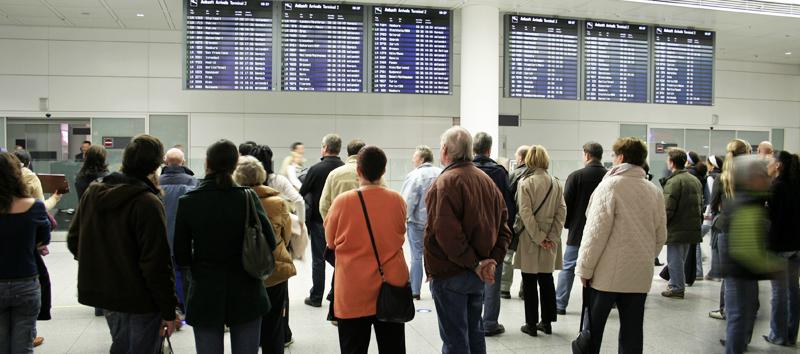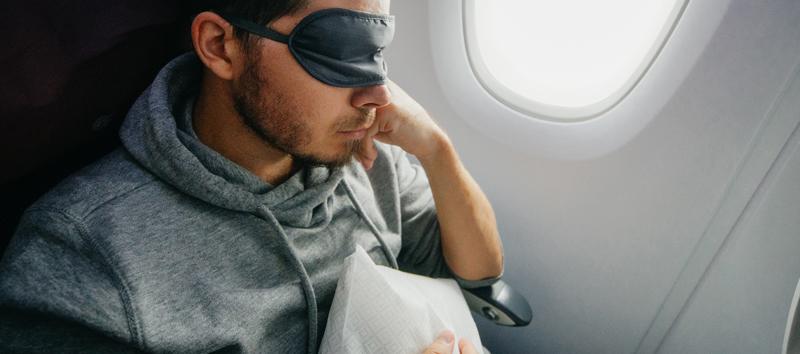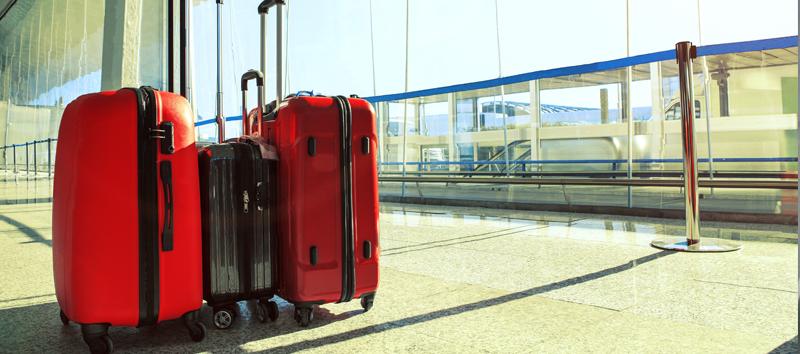[Note: This article was written during the coronavirus (COVID-19) pandemic. We recommend that you check the Centers for Disease Control and Prevention (CDC) for travel advisories and health information when making travel decisions.]
Flying under any circumstances can be an exhausting and stressful experience. Will you make it to the airport on time? How long will it take to get through security? What if your flight is delayed or canceled? The list of ordinary air travel “what-ifs” goes on ...
But what if you just had a head injury and need to travel? Or maybe you had a concussion a few weeks or months ago, and you’re still having symptoms? Is it safe to travel?
Those are questions we’re used to answering. Our clinic, Cognitive FX, is located in Provo, Utah. Our patients come from across the world for post-concussion syndrome treatment. Many of them have to fly to get here.
Patients often ask if flying will make their concussion symptoms worse. The bad news is that it probably will. The good news is that the ill effects are not permanent.
Because concussions are our specialty, and because so many of our patients fly here for treatment, we have a lot of experience with successfully guiding them through the air travel process.
In this article, we’ll share the advice we give our patients regarding travel, including which symptoms can be worsened by air travel and how to minimize them.
Have your concussion symptoms lingered for weeks, months, or even years? On average, our patients improve by 75% after treatment at our center specializing in post-concussion therapy. To see if you are eligible for treatment, schedule a consultation.
Note: Any data relating to brain function mentioned in this post is from our first generation fNCI scans. Gen 1 scans compared activation in various regions of the brain with a control database of healthy brains. Our clinic is now rolling out second-generation fNCI which looks both at the activation of individual brain regions and at the connections between brain regions. Results are interpreted and reported differently for Gen 2 than for Gen 1; reports will not look the same if you come into the clinic for treatment.
Is It Safe to Fly After a Concussion?
In general, it is usually safe to fly after a concussion. However, air travel involves:
- Extreme visual and auditory stimulation: fluorescent lights, noise, large crowds of people in small spaces.
- Time-sensitive decision-making: How do I get to my gate? Where can I get food? Do I even have time to get food?
- Stress and confusion: My gate changed suddenly. Are we boarding? What do you mean my bag won’t fit into the overhead compartment? I won’t make my connection!

It’s easy to get overstimulated and overwhelmed with a concussion. The effects of the concussion make it even harder to function normally and to make decisions, making airports unpleasant at best.
You should also consider your injury. Was your concussion very recent? Did you suffer a traumatic brain injury? Are you suffering from post-concussion syndrome? Your answers to these questions will influence how advisable it is for you to fly and what precautions you should take if you do.
What If You Suffered a Concussion Recently?
Sometimes people are in situations when they really need to travel, but they’ve just suffered a concussion. People have accidents on vacation. Athletes travel for competition or training, and get concussions away from home. Car accidents happen on business trips. There are many reasons you might need to travel with a concussion.
With very few exceptions, it’s generally safe to fly with a concussion.
What Do the Studies Show?
There aren’t many studies about the effects of flying after a concussion.
One small study of collegiate athletes and military cadets who flew within hours after an injury found that neither the severity of their symptoms nor the recovery time was affected by the flight when compared to those who did not fly immediately after a concussion.
On the other hand, a study of NHL players who flew within 6 hours after a game in which they sustained a concussion had a slightly longer recovery time. Those players missed an average of one-third more games after injury than those who did not fly immediately after injury. The authors of the study speculated that this could be due to decreased oxygen in flight and lack of brain rest after the injury.
Speaking of Brain Rest: How Much Sleep Have You Had?

Getting a proper amount of quality sleep is very important to concussion recovery. During restorative sleep, the brain flushes out toxins that build up during the day. One study showed that better sleep quality was tied to better brain function after brain injury.
(If you’re experiencing sleep problems after a concussion, this article might answer some of your questions and give you some ideas to improve your sleep.)
What If You Just Had a Concussion... But You Feel Fine?
If you just got a concussion but you feel fine, it’s possible you’ll experience delayed onset of symptoms. This isn’t necessarily because of the flight (though it could be); it's just that sometimes, it takes a few days or even weeks after a concussion before the brain starts struggling and symptoms appear.
Alternatively, it could be that your symptoms are minimal, but the exhausting and stressful conditions of flight travel push your brain too far, causing symptoms to emerge. (We’ll discuss specific air travel stressors and symptoms later in this article.) While it’s rare for symptoms to suddenly appear during a flight, it is possible.
Is It Safe to Fly with Post-Concussion Syndrome?
If your mild traumatic brain injury (mTBI) happened more than a few weeks ago and you’re still experiencing symptoms from it, you could be suffering from post-concussion syndrome. (For more information, please refer to our Complete Guide to Post-Concussion Syndrome.)
Post-concussion syndrome is a condition in which, after a concussion, the brain doesn’t return to its normal, efficient, pre-concussion way of functioning. Instead, it sticks with the inefficient paths it resorted to while dealing with the effects of the concussion. This leads to persistent concussion symptoms that you might experience daily or when some stressor aggravates them.
It is safe to fly with post-concussion syndrome, but it will probably make your symptoms worse temporarily. We encourage our patients not to let fear overcome their desire to fly for whatever reason, whether it be to get to treatment or for some other important event in their lives.
We caution them that the longer they live with their symptoms, the more accustomed they become to them. That only makes it harder to overcome them in the future. It’s better to endure the short-term consequences to go wherever they need to go for treatment, or at least to take measures to minimize the severity and duration of symptoms.
Have your concussion symptoms lingered for weeks, months, or even years? On average, our patients improve by 75% after treatment at our center specializing in post-concussion therapy. To see if you are eligible for treatment, schedule a consultation.
Are There Times You Shouldn’t Fly with a Concussion?
There are times when flying is not advisable (or at least, not without the consent of your physician). If you just had a severe traumatic brain injury (TBI), you might not want to fly immediately afterwards. For example, if your injury involved a skull fracture or significant bleeding, you definitely need to follow your doctor’s advice on the topic.
Another common-sense recommendation is not to fly when you’re sick. This is true whether you have a concussion or not. If you have a fever or the flu, it’s not good for you or your fellow passengers if you choose to fly.
Which Concussion Symptoms Can Worsen When Flying with a Concussion?
Realistically, any of your concussion symptoms might get worse when you fly. In this section, we’ll briefly discuss some of the more common symptoms that are aggravated by flying.
- Headaches: Headaches are one of the most common concussion symptoms. They can be made worse by the overstimulation that results from being in an airport and on a flight. There’s the noise of so many people talking at once plus the constant announcements in the airport and on the flight. Fluorescent lighting in the airport and light changes during the flight can also contribute to worsening headaches.
- Anxiety: Anxiety and panic attacks can result from the same issues that cause headaches: overstimulation, noise, movement, and lighting. For many people, flying is very stressful in and of itself. If increased anxiety is one of your concussion symptoms, the stress of flying is probably going to exacerbate it.
- Pain and tension: Persistent neck and shoulder pain are another common concussion symptom. This pain might be paired with a headache.
- Extreme fatigue: Overstimulation can also bring on extreme fatigue as your concussed brain struggles to cope with so many extra demands. In addition, inadequate sleep duration and quality before and after a flight — a common issue for anyone — can induce fatigue, especially if your flight involves changing time zones.
- Nausea and vertigo: Nausea and vertigo after a concussion are commonly caused by vestibular system dysfunction. The vestibular system is located in the inner ear; it helps your brain process balance and spatial awareness. Getting through an airport often involves navigating large, moving crowds of people. For some patients, trying to walk as the crowds seem to sway around them sets off vertigo and a headache. Going up and down escalators affect others. Altitude changes and turbulence during flight can also be a problem if your vestibular system is malfunctioning. If you have to use the restroom during flight, your brain might send conflicting messages during the unstable walk there and back that lead to nausea and vertigo.
- Feeling overwhelmed: A brain dealing with the effects of a concussion can get tired quickly, which can lead to feeling overwhelmed. It becomes really hard, or even almost impossible, to make decisions. Things like getting through security, making your way to the gate, and dealing with flight delays and changes might suddenly become very challenging tasks.
What Can You Do to Minimize Concussion Symptoms While Flying?
Benjamin Franklin said, “An ounce of prevention is worth a pound of cure.”
Whether your concussion was recent or you’re dealing with symptoms of post-concussion syndrome, we’ve learned from helping our patients that there are many preventative steps you can take to minimize your concussion symptoms when you fly.
In this section, we’re going to share some things you can do before, during, and after a flight to ease those symptoms.
Plan Before You Fly

Planning ahead is crucial if you want to minimize your concussion symptoms when traveling, especially by air. The more decisions you make ahead of time, the easier the execution of the plan will be.
- If possible, enlist a travel companion to accompany you on the trip. This person can keep you on track and help if you start feeling overwhelmed.
- If no one can come with you on your trip, look at the resources offered by airports and airlines for people traveling with disabilities. You can arrange for someone to meet you at the curb or baggage check area to help with your baggage, accompany you through security, and bring you to your gate. You might also be allowed to board early, which will reduce stress and confusion. You generally need to note this on your flight reservation, but you can always call the airport ahead of time and ask about what services they provide.
- Purchase a seat in Business Class or First Class if you can afford it. These seats are more comfortable, there’s more space, and it’s quieter.
- Make a list of all the things you need to take with you. Check them off as you pack.
- Make a list of the things you need to do when you arrive and during your stay. A daily schedule will reduce your stress.
- If possible, plan ahead for food. When, where, and what are you going to eat? One of our patients, Olivia Seitz, stayed in an Airbnb apartment with a kitchen during treatment. She made a menu plan and shopping list for the entirety of her stay. Her husband took care of the shopping and cooking. This ensured she had healthy food to eat and could focus on treatment and rest during her time in Utah.
- Transportation is another issue. In the U.S., many people choose to rent a car. We encourage you to carefully consider other options, unless you have someone who can drive for you. Driving in a new location can be stressful for anyone. You aren’t familiar with the location or the vehicle. There could be construction or confusing highways and streets. If your concussion symptoms ramp up, driving in a new place can quickly become dangerous.
- Schedule some time to rest after you arrive so you can recover from any fatigue or symptoms that flare up before you move on to the reason for your travel.
If You’re Changing Time Zones
If your flight involves changing time zones, you also need to plan for the effects of jet lag on your sleep and on your medication schedule (if you take medication).
Sleep
We advise our patients to adjust their sleep schedules gradually ahead of flights so they are more acclimated to our time zone by the time they arrive for treatment. You can change the time you go to sleep and wake up by 30 minute increments before your trip to make the transition easier.
If you’re thinking of taking any sleep medications during your trip, be sure to ask your doctor before you go if it’s OK to do so.
Sleep might be difficult if you have jet lag, but remember: That’s normal. You should still prepare for it though. SleepFoundation.org has additional recommendations you might want to check out before your trip to make it easier.
Medication

If you take medication, plan ahead for that too.
Are there medications you always take at a certain time of day, such as at 7 a.m. and 7 p.m.? If so, you might need to gradually adjust that time to avoid having a big change in dosage time.
Are there medications you need to take at the same time no matter what time zone you’re in? (Ask your doctor.) In that case, you might need to set an alarm to be sure you don’t sleep through a dose or forget to take it as you become adjusted to the new time zone.
To avoid confusion about whether you remembered to take your medicine, it’s a good idea to use a pill organizer box while you travel.
Finally, be aware of any medications that cause side effects such as drowsiness or alertness, because they could interfere with your sleep schedule at your destination.
How to Minimize Concussion Symptoms During the Flight
Our suggestions for how to minimize concussion symptoms during the flight are sensible for any traveler; however, they’re especially important for those flying after a concussion or with concussion symptoms:
- Proper hydration and nutrition are important. This is not the time for a bag of chips and a soda! Drink lots of water and pack healthy snacks for the flight.
- Avoid alcohol and caffeine before and during the flight.
- If you suffer from noise sensitivity, use high quality earplugs or noise-cancelling headphones. If you want to listen to something, try calming nature sounds or Brainwaves (something our patients listen to during and after treatment).
- If you suffer from light sensitivity, wear sunglasses or an eye mask during the flight.
- If you start feeling anxious, be aware of your breathing. Are you breathing from your chest (not good) or your diaphragm (good)? Try to meditate, and work at staying calm.
- Do things to avoid getting sick, such as washing your hands often. Wear a mask if necessary.
- Anticipate events that might cause your symptoms to flare, such as walking through the aisle of the airplane to the bathroom and having to navigate that confined space.
- If you don’t need to, don’t rush to get off the plane, especially if no one is traveling with you to help. If you’ve asked for airline assistance, someone will be waiting for you at the door of the airplane.
At Your Destination
Once you’ve arrived at your destination, it’s time to rely on the planning you did ahead of time. Take some time to rest and stabilize before you move on to the main event. Eat a healthy diet and try to get enough sleep. Don’t be afraid to ask for help when you need it. And finally, be patient with yourself: Travel puts a lot of stress on your brain.
Final Thoughts
Concussions and flying safely can go together, but it’s important to be both realistic and prepared. Flying is stressful and tiring for anyone; flying with concussion symptoms is going to be even more so. However, if you plan and prepare, you can reduce symptom severity. Don’t let your concussion keep you from the travel you want to do.
Note: Have your concussion symptoms lingered for weeks, months, or even years? On average, our patients improve by 75% after treatment at our center specializing in post-concussion therapy. To see if you are eligible for treatment, schedule a consultation.













